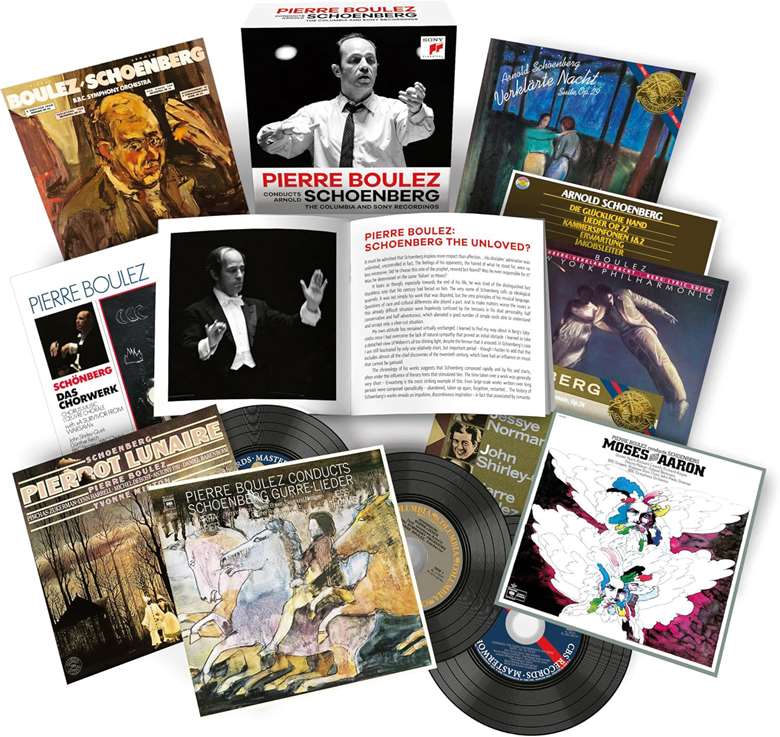Review - 'Pierre Boulez Conducts Arnold Schoenberg'
Richard Whitehouse
Friday, August 9, 2024
Richard Whitehouse recalls Pierre Boulez’s advocacy for the bogeyman of modernism

As someone who commemorated Schoenberg by emphasising his irrelevance even before his actual death, Pierre Boulez recorded more of this composer than almost any other. The bulk of these recordings, made during his 20-year association with CBS/Columbia (latterly Sony), have been reissued on several occasions – notably as part of the 2014 ‘Complete Columbia Album Collection’ devoted to Boulez (1/15) – but this release gathers all the relevant albums in an economical format that makes plain Boulez’s dedication, however equivocally, to the Schoenberg cause.
As music director of the New York Philharmonic during the 1970s, Boulez recorded only the string orchestra version of Verklärte Nacht with them in September 1973 – a rather lacklustre reading that likely prompted the decision to locate further such projects in London. West Ham Central Mission was evidently ablaze with Schoenberg in November and December 1974, passages from Gurrelieder and Moses und Aron being recorded on the same day. The former gets a charged and uninhibited account, with Boulez’s late-Romantic inclinations in full flow. Jess Thomas and Marita Napier are suitably ardent during Part 1, and the choral items in Part 3 have a resplendence that sets Kenneth Bowen’s gleefully sardonic Klaus the Fool or Günter Reich’s stylised narration in the ‘Wild Hunt’ melodrama into sharp relief.
Reich makes a powerful and tormented Moses in Schoenberg’s unfinished magnum opus – a telling foil to the suave and ingratiating Aron of Richard Cassilly, with the BBC Symphony again in fine form. Boulez’s 1995 remake (DG) brings more finely wrought grandeur to the choral fresco ending Act 1, but the scene of The Golden Calf and the Altar in Act 2 has a physicality not latterly equalled. Has the final confrontation between the protagonists been realised with more anguished sense of the ‘human drama’ being played out than here?
Having recorded a quirky Pierrot lunaire with Helga Pilarczyk in 1961 (Adès), Boulez opted for a starrier line-up in Paris 16 years on, but its smoothly contoured instrumental playing and Yvonne Minton’s over-sung rendition of the Sprechstimme neuters the expressive acuity of this trailblazing score, and his 1997 remake with Christine Schäfer (DG) is far superior. Nor is Boulez’s 1976 account of the Variations for Orchestra, the BBC SO unfailingly accurate if lacking commitment, preferable to his more nuanced 1991 remake in Chicago (Warner), but an involving Five Orchestral Pieces finds the partnership at something like its best, while the tangible dread of Begleitmusik zu einer Lichtspielszene and the graphic terror of A Survivor from Warsaw (Reich again a potent narrator) remain Schoenberg interpretation at its finest.
Boulez returned to the Serenade 18 years after his recording with Domaine Musical (Wergo), and if this 1979 account with Ensemble Intercontemporain feels more streamlined, its textural contrasts seem no less scintillating. John Shirley-Quirk brings real soulfulness to its Petrarch setting, though his Ode to Napoleon cannot quite match David Pittman-Jennings’s feeling for its scurrilous humour in Boulez’s 1998 remake (DG). In between, Jessye Norman makes an eloquent case for the chamber reduction of ‘Lied der Waldtaube’ from Gurrelieder.
Boulez’s 1977 Erwartung catches its unnerving immediacy on the wing, with the BBC SO on commanding form and Janis Martin a striking if sometimes abrasive soloist. This had to wait five years for inclusion in a 1980/81 miscellany with the EIC in both Chamber Symphonies – the First sounding incisive if over-driven, the Second as methodical if somewhat detached – and the atmospheric Three Chamber Pieces. Minton wholly excels in the elusive Four Orchestral Songs, its incantatory ‘Seraphita’ an unacknowledged masterpiece, and Siegmund Nimsgern summons expressive fervency in Die glückliche Hand – its effortful scenario at odds with its evocative music. He fronts an impressive cast in Die Jakobsleiter, and if later recordings of this torso are less stark, the closing ‘symphonic interlude’ has an undeniably mesmeric aura.
Boulez’s 1982 revisiting of the Suite-Septet with the EIC is more accurate if less characterful than with the Domaine Musical 23 years before (Adès). Its punchy humour duly complements Verklärte Nacht, whose string sextet original emerges superbly played if a little too calculated. From 1982‑86, mainly with the BBC Singers, the last two albums collate the music for chorus. Boulez seems unmoved by Friede auf Erden but captures the playfulness of the Op 27 Pieces and irony of the Op 28 Satires. The Op 35 Choruses and two sets of German Folk Songs can rarely have been given with such clarity, or the late settings of Jewish texts with such gravitas. Shirley-Quirk brings a burnished repose to Kol Nidre and to the luminosity of the unfinished Modern Psalm that finds Schoenberg reassessing his beliefs out of hope rather than certainty.
Some gaps later filled were the Violin and Piano Concertos (Warner, then Decca) and the tone poem Pelleas und Melisande (Warner, then DG), leaving the comic opera Von Heute auf Morgan as the only major omission. In place of notes (or texts and translations), Sony has reproduced Boulez’s essay Schoenberg the Unloved?, written for the 1974 centenary and no less relevant 50 years on as to his vexing yet endlessly absorbing contribution to Western musical culture.
This article originally appeared in the September 2024 issue of Gramophone. Whether you want to enjoy Gramophone online, explore our unique Reviews Database or our huge archive of issues stretching back to April 1923, or simply receive the magazine through your door every month, we've got the perfect subscription for you. Find out more at magsubscriptions.com







